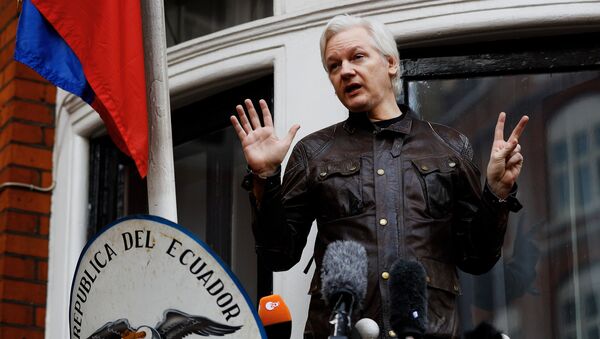The Atlantic article, entitled "The Secret Correspondence Between Donald Trump, Jr. and WikiLeaks," turns 23 messages from WikiLeaks and three brief replies from Junior into a nearly-2,000 word article. Every correspondence is meticulously documented and analyzed.
It sure looks like Julian Assange admitted to Don Jr that WikiLeaks is a "pro-Trump, pro-Russia" organization…https://t.co/E78SqMRKge pic.twitter.com/tsH7TFSq2q
— Caroline O. (@RVAwonk) November 13, 2017
Most of the conversation is fairly innocuous, with WikiLeaks asking Trump, Jr. to help disseminate stories on their website. The most juicy part comes when WikiLeaks hits Junior with an "unusual idea" on October 21, 2016.
"Leak us one or more of your father's tax returns," WikiLeaks proposed. The benefits to this are threefold: the New York Times has already done "most of the harm" by revealing Trump's tax writeoffs, a "most biased source" could reveal the returns and "distort them into the worst posible [sic] light," and "If we publish them it will dramatically improve the perception of our impartiality."
Here is the entire chain of messages with @wikileaks (with my whopping 3 responses) which one of the congressional committees has chosen to selectively leak. How ironic! 1/3 pic.twitter.com/SiwTqWtykA
— Donald Trump Jr. (@DonaldJTrumpJr) November 14, 2017
"That means the vast amount of stuff that we are publishing about Clinton will have a much higher impact, because it won't be perceived as coming from a 'pro-Trump' 'pro-Russian' source, which the Clinton campaign is constantly slandering us with."
You may be wondering why we've bolded the end of the quote. The answer for that is that The Atlantic saw fit to omit that part, presumably to smear WikiLeaks. By omitting the end of the quote, WikiLeaks seem to be tacitly admitting that they carry a pro-Trump, pro-Russia bias.
Incredible. The Atlantic edited "Trump Jr" DM story to reverse its meaning even removing "that the Clinton campaign is constantly slandering us with" right after "pro-Russia". Full text changes everything. https://t.co/8pNUF1xW23
— Julian Assange 🔹 (@JulianAssange) November 14, 2017
Contacted Trump Jr this morning on why he should publish his emails (i.e with us). Two hours later, does it himself: https://t.co/FzCttGSyr6
— Julian Assange 🔹 (@JulianAssange) July 11, 2017
The Atlantic didn't even bother to add an ellipsis to suggest that there was more to the quote that they were omitting. That would be disingenuous as well, but not a blatant manipulation of WikiLeaks' words to make them look worse.
Not that this breach of integrity mattered to several outlets, with ABC, CBS, GQ and The Guardian all running The Atlantic's altered quote. Of course, at the time, Trump, Jr. had yet to release the full transcript of the Twitter conversation and reveal The Atlantic's mischief-making.
Major journalism fails by the Atlantic author @juliaioffe in the Atlantic hit piece:
— Suzie Dawson (@Suzi3D) November 14, 2017
She didn't disclose either of these key facts:
1. Assange's internet had been cut off prior to the October 21 tweets
2. Assange had publicly discussed having asked Trump JR to submit docs to WL pic.twitter.com/9ymtMPsP9Q
In case you were hoping it was an honest mistake on the part of author Julia Ioffe or The Atlantic's editorial team, it wasn't. Shortly after Trump Jr. unveiled the DMs, Ioffe retweeted them with the comment "There are a couple missing pages in this release." She then followed it up: "My bad, didn't realize there were three tweets. Carry on!"
In other words, Ioffe clearly had the full text of the DM's — otherwise it wouldn't make sense for her to know that there were multiple pages, journalist Caitlin Johnstone points out in a Medium post on Ioffe's "scoop."
Life cycle of a Trump story:
— Chuck Ross (@ChuckRossDC) November 13, 2017
— Story publishes
— People skim the story, freak out
— Questions about whether this is the end of Trump
— That one dude does the BOOM
— People read the story
— Meh, they're not that bright but that's not collusion
2/ Every new article on this matter goes through exactly the self-fueling, distortive social media process described below until it tires itself out; last night's article — while interesting and newsworthy to be sure — quickly traversed these steps:https://t.co/AdVm0dAD6X
— Glenn Greenwald (@ggreenwald) November 14, 2017
Trump, Jr. didn't reply to WikiLeaks' offer or respond to any further message from them — even as their offers became more and more outlandish, such as a suggestion that candidate Trump should challenge the results of the election if he loses and that President Trump should suggest Australia appoint WikiLeaks founder Julian Assange as their ambassador to the US.


